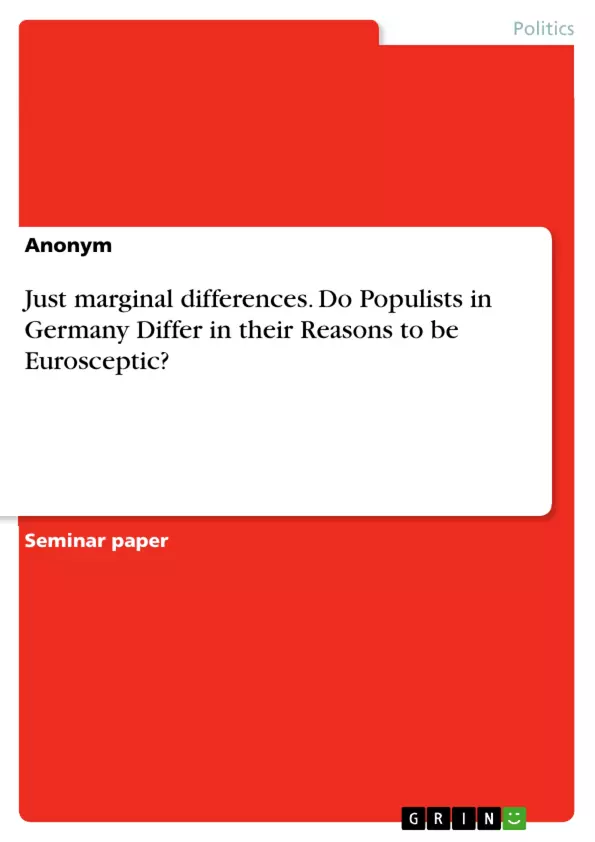Euroscepticism has become a timely topic with increasing relevance for the cooperation within the EU. However, some groups within European societies like certain types of populists might differ in their reasons to be eurosceptic. Particularly due to distinct characteristics of populists and the influence of the populist movement as the driving force of the backlash against the EU.
This is also visible in the EU’s largest member state Germany.
This term paper examines whether there are differences in the reasons to distrust the EU between Left-Wing Populists and Right-Wing Populists in Germany by testing the influence of widely assumed reasons like nationalism, anti-immigration sentiments and economic concerns.
The results of different OLS-regressions with standardized coefficients show a positive impact of anti-immigration sentiments for both types of populists while, contradicting the theoretical argument, being a stronger predictor for left-wing populists. Moreover, economic concerns and nationalism are not strongly associated with being eurosceptic with just small differences between the types of populists. An alternative reason for being eurosceptic seems to be distrust in the national government as a cue for also distrusting the EU as the major factor for both groups while being slightly stronger for right-wing populists. This term paper aims to contribute to the literature on Euroscepticism and tries to help broaden the understanding of how the EU could become more attractive for certain groups of the population.
Inhaltsverzeichnis (Table of Contents)
- Introduction
- International Institutions and the Relevance of Public Opinion
- Euroscepticism in Germany
- Data and Methods
- Results
- Discussion
- Conclusion
Zielsetzung und Themenschwerpunkte (Objectives and Key Themes)
This term paper examines the reasons for Euroscepticism among left-wing and right-wing populists in Germany. It aims to contribute to the existing literature on Euroscepticism and increase our understanding of how to make the EU more attractive for certain groups of the population.
- Differences in Euroscepticism between left-wing and right-wing populists in Germany
- The influence of factors like nationalism, anti-immigration sentiments, and economic concerns on Euroscepticism
- The role of distrust in the national government as a potential driver of Euroscepticism
- The importance of public opinion in shaping European integration
- The potential impact of Eurosceptic sentiments on EU cooperation and legitimacy
Zusammenfassung der Kapitel (Chapter Summaries)
The introduction outlines the research question, emphasizing the importance of understanding Euroscepticism in the context of rising anti-EU sentiment and the EU's role in addressing global challenges. It highlights the unique characteristics of left-wing and right-wing populist parties in Germany and their motivations for opposing the EU. Chapter 2 discusses the role of public opinion in European integration, referencing relevant theories like audience cost theory. It explores how public preferences can influence international negotiations and the dynamics of the "Two-Level Game."
Schlüsselwörter (Keywords)
Euroscepticism, Populism, Left-wing populism, Right-wing populism, Germany, EU, European integration, Public opinion, Audience cost theory, Two-Level Game, Nationalism, Anti-immigration sentiments, Economic concerns, Distrust in government.
- Quote paper
- Anonym (Author), 2023, Just marginal differences. Do Populists in Germany Differ in their Reasons to be Eurosceptic?, Munich, GRIN Verlag, https://www.grin.com/document/1431422



